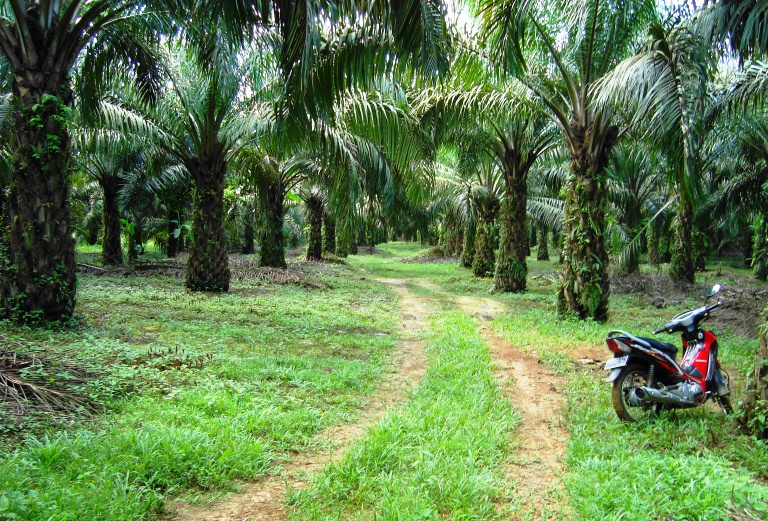
Have you ever found yourself sitting on a creaky bed in a four dollar a night hostel in Borneo, sniff-testing your clothes and asking yourself “How did I get here?”
Well I have, only I knew exactly how I got there: it was on my quest to experience the palm oil industry first hand.
I have a love/hate relationship with the palm oil industry. Palm oil can be found in a range of products from french fries to shampoo. When grown sustainably, palm oil is an amazing product which is shelf stable, cheap, and has a higher yield per acre than all other plant based oil. However, palm oil grows best in tropical areas: areas that are also ecological hotspots with high biodiversity. These areas are prime habitat for primates, elephants, rhinoceroses, specialized reptiles, and a plethora of other amazing creatures. In order to make room for more palm oil plantations, these rainforest habitats are being decimated.
Additionally, many palm companies use excessive fertilizers and chemicals to enhance the production of their crops, which then run off into the remaining habitat and nearby waters, with scientists still debating the consequences.
To combat these negative practices, the Roundtable for Sustainable Palm Oil (RSPO) was formed. The goal of RSPO is not to stop the palm oil industry, but instead to embrace the benefits of palm oil in a sustainable manner. The guidelines for plantations and companies to become RSPO certified include reduced environmental impact and increased benefits for workers and surrounding communities. This certification allows companies who purchase palm oil for their products to be able to source sustainable palm oil. Cheyenne Mountain Zoo, located in Colorado Springs, Colorado, amongst other zoo and environmental organizations, published a list of companies that do not use palm oil, those that use sustainable palm oil, and those that use non-sustainable palm oil. This list helps consumers wanting to purchase RSPO products much more feasible.
So why not just boycott the palm oil products all together? For me, it took a journey to Borneo for the reasons to sink in. While the unsustainable palm oil industry is wreaking havoc on the environment, it is also creating economic growth and stability. Standing in an old man’s backyard lined with palm oil trees, I realized it is the local community members who are the ones losing out on the deal. He isn’t cutting down pristine forests or dumping gallons upon gallons of chemicals into the ecosystem. He is making a living. How bizarre must it be to have dozen of students in your backyard, taking pictures of your livelihood and struggling to understand the industry.
I imagine it would be similar to someone visiting my parents’ backyard orchard and asking how they can participate in such an evil practice.
And those big corporations? They aren’t all that bad either. They are providing a living for thousands of workers. In Kuala Lumpur, I waited in line for almost two hours behind at least 100 plantation workers flying home; each employee was wearing their plantation polo, baseball hat, and backpack. These workers are living hundreds of miles from their families but were headed home with a multitude of gifts, from toasters to toys, for their loved ones.
I was able to meet a family member affected by the palm oil industry when I went on an eco-tour with a guide outside of Sandakan. My guide’s father worked for the palm oil plantation. The plantation paid for her basic education and allowed her to pursue further education in conservation. She had seen what the industrialized palm oil trade was doing to the environment first hand and wanted to help protect the environment from what she had seen.
It was amazing to listen to her own personal conflict with palm oil—she was appreciative of the industry that had provided for her, but also determined to help make that industry change.
RSPO has a long way to go to achieve its goals. Many organizations use RSPO as “greenwashing:” promoting sustainable practices for public relations rather than environmental reasons. The guidelines range from recommendations to requirements making the standards variable between companies. However, once certified, the companies continue to undergo review. If companies fall below requirements their RSPO certification is suspended or terminated, and often business agreements with large manufacturers are lost. As RSPO continues to grow, it welcomes the input of purchasers, suppliers, and consumers on how to make the process better for all.
I too, am far from perfect in my own palm oil purchasing. Non-RSPO palm oil generally slips into my apartment in the least expected products. The most recent stow-away was in gourmet ketchup. I would never have thought to check ketchup for palm oil. Although it can prove difficult to find sustainable establishments, especially when traveling or eating out with friends, many restaurant corporations have pledged to source sustainable palm oil in the coming years, giving me hope that more companies will move to source exclusively from RSPO palm oil companies.
After three weeks in the jungle, I arrived home with terrible smelling luggage and a trunk full memories, but most importantly, I brought home a new appreciation for the sustainable palm oil industry. While my heart breaks with the travesties of irresponsible palm oil production, it is simultaneously filled with hope for its sustainable future.
Author: Mary Beth Sarnowski
Image: wiki commons
Editor: Renée Picard








Read 1 comment and reply